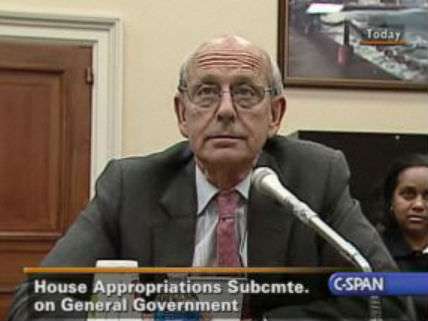Stephen Breyer, Advocate of Pro-Police Judicial Deference, Turns 78 Today
The liberal jurist was born on this day in 1938.

When President Bill Clinton nominated Stephen Breyer to the U.S. Supreme Court in 1994, he said Breyer would be a justice who would "strike the right balance between the need for discipline and order, being firm on law enforcement issues but really sticking in there for the Bill of Rights." Today is Stephen Breyer's 78th birthday. Let's take the opportunity to briefly consider how Breyer's record measures up to Clinton's lofty words.
The first thing to know about Justice Breyer is that he frequently preaches the virtues of judicial deference. For example, in his 2010 book, Making Our Democracy Work: A Judge's View, Breyer insisted that the courts should defer to the other branches of government whenever possible. Judges must "take account of the role of other governmental institutions and the relationships among them," Breyer wrote, in order to "maintain a workable relationship between the various branches of government."
Perhaps unsurprisingly, that quest for a "workable relationship" has led Breyer to vote routinely in favor of granting broad leeway to law enforcement officers and agencies.
Consider the 2014 case of Navarette v. California. At issue was an anonymous phone call made to 911 about an allegedly dangerous driver. That anonymous and uncorroborated tip prompted the police to make a traffic stop that led to a drug bust. According to the Court's majority opinion, "the stop complied with the Fourth Amendment because, under the totality of the circumstances, the officer had reasonable suspicion that the driver was intoxicated." Among that 5-4 pro-police majority was Justice Breyer.
Now consider the dissenting opinion filed in that same case by Justice Antonin Scalia. "The Court's opinion serves up a freedom-destroying cocktail," Scalia wrote, joined by Justices Ruth Bader Ginsburg, Sonia Sotomayor, and Elena Kagan. "All the malevolent 911 caller need do is assert a traffic violation, and the targeted car will be stopped, forcibly if necessary, by the police." That troubling scenario, Scalia observed, "is not my concept, and I am sure it would not be the Framers', of a people secure from unreasonable searches and seizures."
The 2012 matter of Maryland v. King offers another case in point. Once again Justice Breyer voted in favor of aggressive law enforcement tactics, this time joining the majority in allowing the police to conduct warrantless DNA swab tests incident to arrest. "Make no mistake about it," Justice Scalia shot back in dissent (again joined by Ginsburg, Sotomayor, and Kagan), "as an entirely predictable consequence of today's decision, your DNA can be taken and entered into a national DNA database if you are ever arrested, rightly or wrongly, and for whatever reason."
So it turns out that Bill Clinton was half right back in 1994. Justice Breyer has indeed proved to be "firm on law enforcement issues." Contrary to Clinton's assurances, however, Breyer has not exactly been "sticking in there" for the Fourth Amendment.


Show Comments (14)